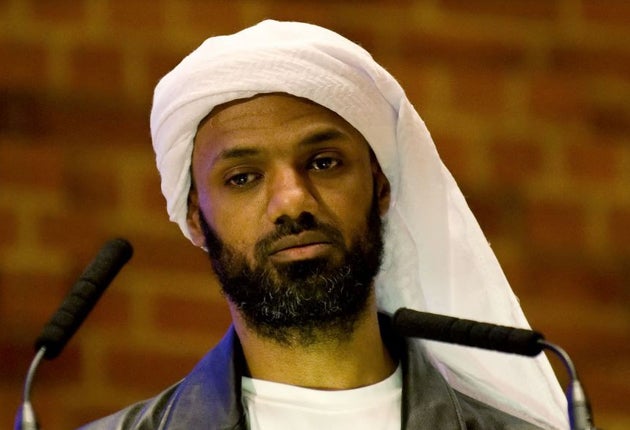Britain's role in treatment of terror suspect to be revealed

Your support helps us to tell the story
From reproductive rights to climate change to Big Tech, The Independent is on the ground when the story is developing. Whether it's investigating the financials of Elon Musk's pro-Trump PAC or producing our latest documentary, 'The A Word', which shines a light on the American women fighting for reproductive rights, we know how important it is to parse out the facts from the messaging.
At such a critical moment in US history, we need reporters on the ground. Your donation allows us to keep sending journalists to speak to both sides of the story.
The Independent is trusted by Americans across the entire political spectrum. And unlike many other quality news outlets, we choose not to lock Americans out of our reporting and analysis with paywalls. We believe quality journalism should be available to everyone, paid for by those who can afford it.
Your support makes all the difference.Secret evidence about the alleged torture of a UK resident captured by the Americans must be made public, the High Court ruled yesterday in a judgment that raises serious questions about what Britain really knew of its ally's interrogation practices.
The case, concerning the treatment of Binyam Mohamed, 31, when he was held under US authority in Pakistan and Morocco, has serious implications about the legality of Britain's role in the "war on terror".
The court has held it was clear from the fact that the UK intelligence services sought to interview Mr Mohamed during his detention and supplied information and questions for his interviews by others "that the relationship of the United Kingdom Government to the United States authorities in connection with Binyam Mohamed was far beyond that of a bystander or witness to the alleged wrongdoing".
The ruling related to the court's previous judgment on Mr Mohamed's claims of torture, which contained seven redacted – or blanked-out – paragraphs. The Independent, and other media, were seeking to have these paragraphs made public.
The Foreign Secretary had claimed that the Americans had threatened to withdraw intelligence co-operation if the material was released.
But yesterday Lord Justice Thomas and Mr Justice Lloyd Jones said they could not accept his evidence that the Obama administration was adopting the same stance as the Bush government. And they could not accept there was anything in the redacted paragraphs that would have prejudiced intelligence-sharing relations.
"As the risk to national security, judged objectively on the evidence, is not a serious one, we should restore the redacted paragraphs to our first judgment," they said.
Mr Mohamed was still being held at Guantanamo Bay awaiting trial at the time of the court's original judgment in August last year, but has since been released and has returned to the UK.
The Foreign Secretary, David Miliband, said he would appeal against the ruling that the US intelligence material on Mr Mohamed should be made public.
Mr Miliband said the Government was "deeply disappointed" by the judgment. The Foreign Secretary warned that the US may no longer be willing to share intelligence if it feared that it might later be disclosed on the orders of a foreign court.
In a statement, he said: "The Government is deeply disappointed by the judgment handed down today by the High Court which concludes that a summary of US intelligence material should be put into the public domain against their wishes. We will be appealing in the strongest possible terms."
Mr Miliband's statement follows comments from the head of MI5, who defended co-operation with countries accused of using torture, insisting it helped prevent many terrorist attacks on British soil.
Speaking for the first time about his organisation's alleged complicity with countries engaged in abuse, Jonathan Evans said the issue had presented "a real dilemma" but it would have been a "dereliction of duty" not to get intelligence on al-Qa'ida and other Islamist groups.
Mr Evans' acknowledgement of the controversial links with foreign intelligence agencies comes at a time when MI5 is facing a series of legal claims from victims of mistreatment as well as an unprecedented investigation by Scotland Yard.
The director-general of MI5 maintained that while he could not comment on specific allegations it was "a very clear and long established principle" that MI5 did not collude in torture or solicit others to torture on its behalf.
However speaking at his old university, Bristol, in a speech commemorating the 100th anniversary of MI5, Mr Evans said action taken in the aftermath of the 9/11 terror attacks had to been seen in the context of the times, when the UK and other Western countries were faced with a terrorist threat that was "indiscriminate, global and massive".
Join our commenting forum
Join thought-provoking conversations, follow other Independent readers and see their replies
Comments